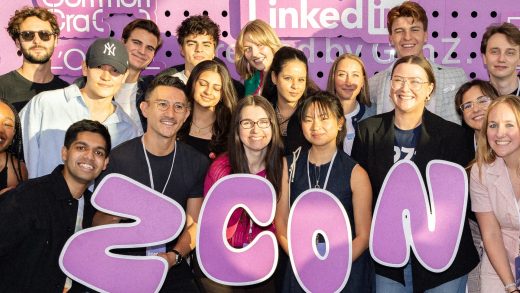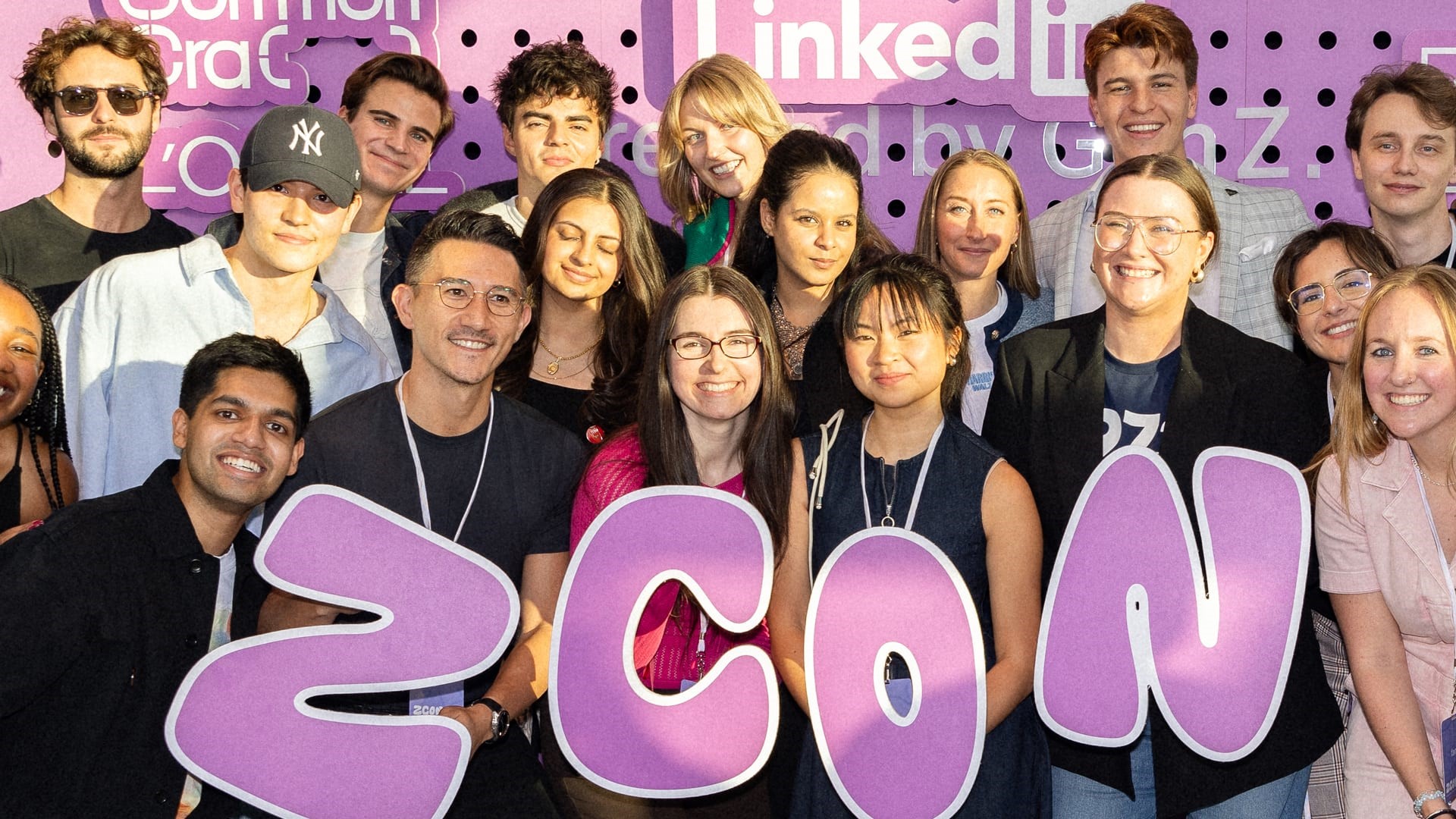I’m a millennial who attended Z-Con, a conference for Gen Z creators and activists. Here’s what I learned
I’m a millennial who attended ZCon, a conference for Gen Z creators and activists. Here’s what I learned
United Talent Agency’s Next Gen is the Gen Z arm helping youth climate activists, mental health advocates, fashion icons, and others lead important discussions.
BY Tania Rahman
A quick Google search will show you exactly what the online world thinks of Gen Z: Journalists and brands alike have reduced an entire generation to a monolithic Brat-obsessed, work-avoidant, demure, and mindful crowd that only knows how to communicate via memes.
Enter ZCon, a two-day affair last week, hosted by United Talent Agency, which billed itself as an event designed by Gen Z, for Gen Z, uniting hundreds of creators, activists, influencers, marketers, and executives. ZCon’s organizers sought to reclaim the mic and pass it among their generation to speak for themselves: It aimed to connect young leaders across a variety of industries with businesses to help marketers meaningfully connect with Gen Z.
The event was driven by Next Gen, the Gen Z practice that is within the entertainment-marketing team at United Talent Agency (UTA), formerly known as JUV Consulting. The agency was founded by Ziad Ahmed and Shaina Zafar while the two were in high school; it was eventually acquired this past March by UTA.
It wasn’t too long ago that millennials were the newcomers to the workforce and the focus of constant media attention: We were the generation bringing real change to the corporate world and beyond, acknowledging our mental health and setting boundaries, all the while maintaining our side-hustle-culture mantras and supposedly thriving in a limitless Girl Boss era. (Never mind that many millennials came of age in the 2008 recession and had no choice but to pick up second or third gigs to make ends meet.) These were traits that we proudly wore on our sleeves until we eventually became . . . the burnout generation.
Media outlets generate lots of clicks with stories about monolithic stereotypes, often pitting generations against one another—despite today’s economy being fueled by a decidedly multigenerational workforce—so it’s no wonder that we were unceremoniously cast aside in favor of the next generation.
But what’s indisputable about Gen Z is that they have come of age in a post-9/11 era, born dialed into social media, while we millennials were busy poking each other on Facebook, and grappled with the trials of adolescence and all that encompassed during the COVID-19 pandemic—the most isolating and depressing period of our lives.
Every generation grows up in unique conditions that, in turn, shape their values, their outlooks, their politics, and the way they navigate the world. Their charge is what breaks down the preexisting barriers set by previous generations and paves the way for those to come.
As a millennial, hearing our generation being called lazy, entitled, or a little too obsessed with our Hogwarts House doesn’t faze me because these are stereotypes born from the rules that our baby boomer parents set, and the world they handed down to us. From what I witnessed at ZCon, Gen Z has something to stand for because they have nothing to lose: Behind much of the slander aimed at this generation was a thoughtful articulation of the context driving their choices.
Bold and values-driven, the individuals who took the stage at ZCon did not shy away from confronting the pervasive problems of their generation and what they intend to do about it, as demonstrated by the panel discussions. These are some of the key takeaways I learned from ZCon:
Voter disengagement and political ideologies
True to the extreme climates in which Gen Z has been reared, the looming election—just days away now—has inspired a myriad of responses, from disenfranchisement to electing not to vote. But make no mistake: There’s clarity behind their conscious decisions.
“I used to run a meme page in high school and had millions of followers. I was 17, and Trump won the election,” said media entrepreneur Tim Chau. “America has seen the rhetoric he’s said about queer people, about women, about immigrants. Even though I was running a meme page, I wanted to write about these things.”
Chau added that their early experiences led them to cofound their own brand, Impact Media, and connect directly with their audience on political matters.
“We’re engaging young people, but are we engaging them in a systematic way? You can hire a high school intern, but are you giving them a seat at the table?” said Chau.
Many Gen Z voters who are eligible to vote this year are electing not to do so. While this may inspire disbelief and scoffing from older voters, Sofia Ongele, director of digital strategy at Gen-Z for Change, shared what might be driving this reasoning.
‘We’re seeing all this carnage that we never thought we’d see in our lifetimes on our phones,” said Ongele, referring to Israel’s war in Gaza and the subsequent destruction of Palestinian lives. “Voting should not be a be-all and end-all. We need to get out of the view of the celebritization of politicians and have more realistic expectations of what this administration can do.”
Alexia Leclercq, a climate activist and environmental justice organizer, added that most of Gen Z want a ceasefire and want to see a free Palestine.
“Young people have always been at the forefront of change,” she said. “We have to listen to their opinion to create a better world and come at it from a place of listening and understanding and holding multiple truths.”
Another panelist underscored the discrepancy of outreach to Gen Z: “I think being Brat and making all these TikToks is cute,” said Jorge Alvarez, a mental health advocate, social impact strategist, and creator, “but it’s not going to change the fundamental thinking of people who are truly not plugged in at the polls.”
Sustainability and climate justice
The erosion of our environment, increased pollution and waste, and climate disaster is not lost on Gen Z, as climate justice was a central topic of conversation at the convention. Earthjustice, a nonprofit environmental law organization, designed a scavenger hunt for attendees, in which we split into groups and sought clues around and outside of the venue.
Many of us (myself included) were confronted with our woefully limited knowledge of the root causes of common environmental issues and trivia—such as how New York City can produce more than 12,000 tons of waste a day.
The future of work
Traditional means of obtaining job opportunities notwithstanding, some Gen Zers have found unconventional routes to their dream jobs—often rooted in challenging experiences in their personal lives, and through social media.
Deja Foxx is the founder of GenZ Girl Gang and has worked for Kamala Harris as an influencer and surrogate strategist—one of the youngest presidential campaign staffers in history. Her journey, she explained on the panel, “Quiet Quitting? No, Loud Leading,” stemmed from a tumultuous childhood, as well as her own experiences working with Planned Parenthood and navigating reproductive rights in her teens, fueling her drive for advocacy.
Gen Z content creators have taken on LinkedIn in a way that has completely changed the course of how the job and networking platform began, connecting with employers and peers alike by simply being themselves.
“Authenticity has never been a strategy to me,” said Nadya Okamoto, founder of the nonprofit Period Inc. “I just get up and make content about the fact that I have my period and I’m on a white couch.”
Next Gen’s Shaina Zafar, who helped orchestrate Z-Con, highlights the transparency that LinkedIn offered.
“Gen Z in particular has really reimagined what it looks like to think about our careers and democratizing access to that information,” she says.
“We want to know what we’re getting paid, what the job description is, and we also want to know what the culture and value of the place is—not only from themselves and their website, but through the people that actually work there.”
How to (actually) change people’s minds
A shared crisis that multigenerational folks can all agree on is the widening polarization between different groups, Americans or otherwise. Zafar, who played multiple roles at the event—from planning and organizing to moderating panels—offered a few choice words: Personal is political.
She says she is less interested in how people show up for their political party or election choices, but underscores that “we can’t divorce ourselves from the fact that when it comes to our identity and lived experiences, people are bringing that into the workplace—and workplaces need to recalibrate to understand that.”
Zafar goes on to point out that “changing people’s minds” is a vast and daunting undertaking, and an esoteric one at that.
“The average American is not going to have the ability to talk to someone that is a refugee, that is a first-gen Muslim,” she says. “These are not the typical type of people who are getting outside of their echo chambers, and that’s true for all of us. To me, it becomes more important that we interrogate who the people we’re interacting with are . . . try to have real conversations [and] measure ourselves against our power and our privilege.”
When asked about how content creators can help drive change, she ends with this: “I don’t think change is defined the same for all of us, but you can change hearts and minds. If you can do that for one person, even if they end up not agreeing with you . . . the fact that you were even able to be that person for them is really powerful.”
ABOUT THE AUTHOR
(5)



